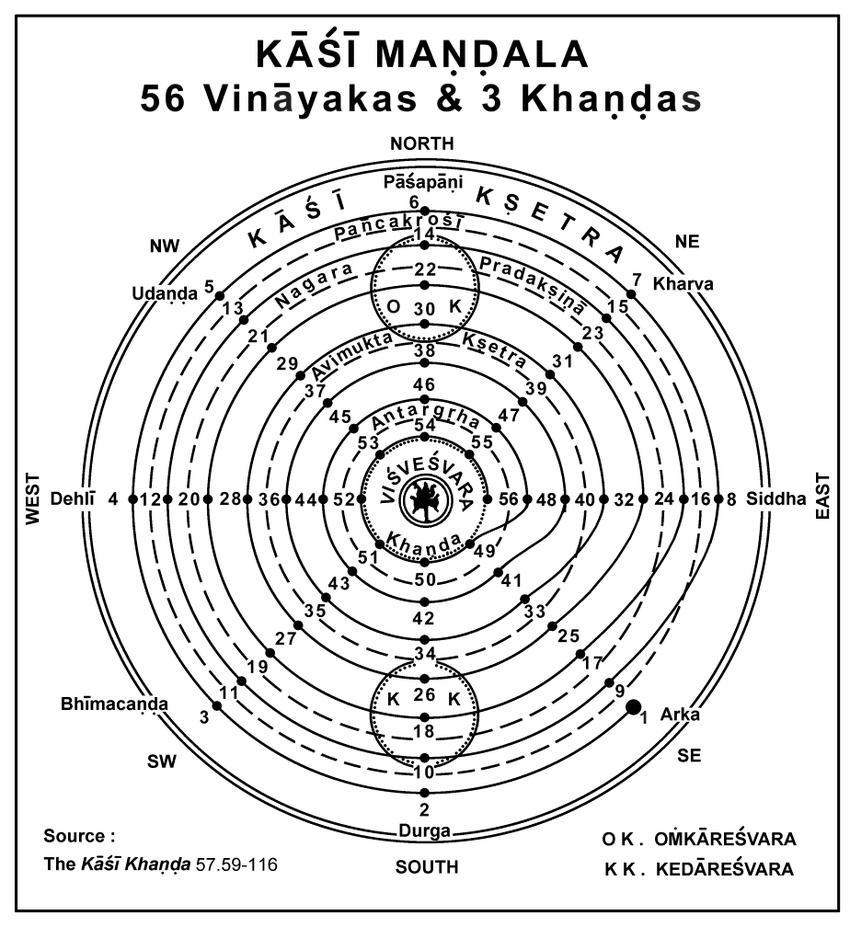 |
| Locations of each of the 56 Vinayakas centered around the shrine of the original Vishvanatha Temple |
Among all the various manifestations of Ganapathi, Dhundi Ganapathi has a special significance. His origins are mentioned in the Kashi Khanda of the Skandapuranam. Also known as Dhundiraja, he has a prime position at the center of Kashi. Along with Dhundi Ganapathi there were 56 other forms of Vinayaka at Kashi. These Vinayakas were situated at the 8 directional points in 7 concentric circles centering around Dhundi Ganapathi near the original Kashi Vishwanatha Temple.
The 1st concentric circle used to have 8 different forms of Vinayakas
1) Arka
2) Durga
3) Bhimachandha
4) Dehali
5) Uddhanda
6) Pashapani
7) Kharva
8) Siddhi Vinayaka
1) Lambodara
2 )Kutadanta
3) Saalakatantaka
4) Kusmandha
5) Mundha Vinayaka
6) Vikatadvija
7) Rajaputra
8) Pranava
1) Vakratunda
2) Ekadanta
3) Trimukha
4) Pancasya
5) Herambha
6) Vighnaraja
7) Varada
8) Modakapriya
1) Abhayada
2) Simhatunda
3) Kunitaksha
4) Kshipraprasadana
5) Chintamani
6) Dantahasta
7) Picandhila
8) Uddandhamundha
1) Sthuladanta
2) Kalipriya
3) Caturdanta
4) Dvitundha
5) Jyestha
6) Gajavinayaka
7) Kalavinayaka
8) Nagesha
1) Manikarna
2) Asavinayaka
3) Sristiganesha
4) Yaksavighnesha
5) Gajakarna
6) Citraghanta
7) Sthulajangha
8) Mitravinayaka
1) Vinayakas 1-5 are mentioned as Moda and others in the Shlokas
6) Jnanavinayaka
7) Dvaravighnesha
8) Avimuktavinayaka
Unfortunately none of these Vinayakas exist as of today in their original Puranika forms as a result of successive waves of barbaric islamic invasions & Temple destruction. Below is a graphical representation of all the above Vinayakas & their respective locations. At the center is original Temple of Vishvanatha.This was mapped out by Prof Rana P.B. Singh of the Benaras Hindu University.
 |
| Locations of the 56 Vinayakas. At the center is the original Linga of Kashi Vishvanath |
Shlokas from the Kashi Khanda of the Skandapurana
The story behind the arrival of Vinayaka at Kashi is explained by Skanda to Agastya maha muni. On the instructions of Shiva; Ganesha arrives at Kashi from the Mandara mountain.
Vinayaka's arrival was shortly followed by the arrival of Shiva himself. Accompanying him were Parvathi, Nandi, Bhringhi. Along with Maha Vishnu, Lakshmi, Brahma, Vishvakarma & others. In this Adhyaya, Shiva eulogizes Dhundi Vinayaka. Shiva explains the meaning of "Dhundhi" in the following Shloka. "The root Dhundh is well known to mean “to search for”. Your name Dhundhi is due to the fact that you search for everything that your devotees require and bestow on them"
Shiva says in the below Shloka that those who come to Kashi should have a darshana of Dhundi Vinayaka 1st followed by Vishveshwara. All obstacles of those who bow down to Dhundi everyday will be removed. Devotee should propitiate Dhundi by means of huge quantities of modaka, dhoopa, deepa.
Following this, Shiva explains the significance of each one of the 56 Vinayakas & their respective locations around Kashi.Arkavinayaka is situated at the confluence of Ganga and Asi. If he is visited on Sundays by people, he will subdue all distresses.
Durga Ganapathi is the destroyer of all wretchedness.
Bhimacandavinayaka removes all fear.
Dehalivinayaka & Uddandha Ganapathi removes all obstacles.
Kharvavinayaka will subdue and shorten even huge obstacles.
Siddhivinayaka is a prompt bestower of powers on a Sadhaka.
Lambodara washes off all the mud of obstacles.
Kuthadanta is the annihilator of difficulties and calamities.
Kusmandha by the devotees for the suppression of great mishaps and calamities.
Mundhavinayaka is called by that name because his body is stationed in Patala.
Those who worship Vikatadvija shall obtain the favour of the Ganas.
A king who has lost his kingdom will win back his kingdom by worshiping Rajaputra Vinayaka.
Those who bow down to Pranava Vinayaka will attain Swarga.
Vakratunda, the remover of mass of sins. Ekadantaka protects from calamities.
Trimukha is the remover of the fear of people of Kashi.
Pancasya rides a chariot drawn by lions.
He is the protector of Kashi. Heramba fulfills all the desires of the people of Kashi.
Vighnaraja Vinayaka is the destroyer of all obstacles.
Varada Vinayaka is to be worshiped for those seeking to be bestowed with boons.
Modakapriya Vinayaka, Shiva says is worthy of being adored.
Sthuladanta bestows enormous siddhis.
Kalipriya punishes those who harass his devotees.
Caturdanta removes all kinds of obstracles.
Dvitundha bestows glory & splendour.
Jyestha Vinayaka is the eldest among all Vinayakas, visiting him will result in acquisition of excellence.
Devotee is honoured in Nagaloka by visiting Nagesha.
The Ganapati named Manikarna is the destroyer of obstacles.
Ashavinayaka fullfills hopes & desires.
Srsthiganesha is the indicator of creation & annihilation.
Yaksha Vighnesha is the destroyer of all obstacles.
Gajakarna is the cause of welfare to all.
Sthulajangha subdues the sins of those who control their minds.
Modavinayaka, Jnanavinayaka, Dvaravighnesha, Avimukta Vinayaka all remove distress of those with humble minds.
Skanda concludes by saying to Agastya muni that by repeating these 56 names of Dhundhiraja, a man shall get whatever he desires.
REFERENCE
Skandapurana by Nag Publishers















